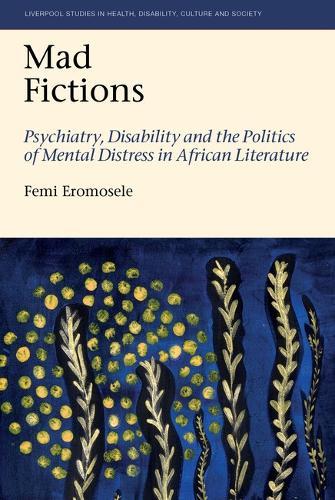Overview
Ebook available to libraries exclusively as part of the JSTOR Path to Open intiative. Mad Fictions is the first book to place African literature in conversation with mad studies and disability studies, offering a groundbreaking reassessment of how madness is represented in African fiction. Challenging dominant readings that reduce madness to a metaphor for collective suffering, Femi Eromosele insists that it is both a site of personal distress and a locus for social justice discourse. The book argues that the simultaneous ubiquity and invisibility of madness in African literary scholarship stems from the dominance of nationalist frameworks in the production of political legibility. It explores the way African writers situate madness at the intersection of the individual and collective body, alternatively upholding and dissolving the boundaries between selfhood and national belonging. Throughout, it explores topics including: Psychiatric power and violence. The imbrication of madness and the nation. The political conditions for the emergence of a Mad discourse. The possibility of narrating a life in the grip of mental distress. The importance of Indigenous and psychiatric epistemologies. Eromosele pushes for an attentiveness to the links between reading practices and sites of exclusion embedded in both culture and politics, a relationship he describes as ‘narrative comorbidity’. Mad Fictions reorients critical discussions toward the lived realities of mental distress, while challenging the nationalist paradigms that have long dominated African literary scholarship. Cover art: ""..deny that!"" Acrylic on canvas, 2023. Nontokozo Tshabalala, myportfolio.com.
Full Product Details
Author: Femi Eromosele
Publisher: Liverpool University Press
Imprint: Liverpool University Press
Volume: 12
ISBN: 9781836244776
ISBN 10: 1836244770
Pages: 264
Publication Date: 07 November 2025
Audience:
College/higher education
,
Postgraduate, Research & Scholarly
Format: Hardback
Publisher's Status: Active
Availability: In Print

This item will be ordered in for you from one of our suppliers. Upon receipt, we will promptly dispatch it out to you. For in store availability, please contact us.
Reviews
""What comes into view when we go beyond reading madness as a textual narrative device in literature? In an elegant, witty prose, Eromosele sets out to answer this question by reconfiguring the contours of scholarly engagement with madness in African literature. By listening attentively to what the mad figure in African literature has to tell us, Mad Fictions showcases the limits of medical discourse, disability studies, and allegorizing literary frameworks, while pointing to the world-making insights that surface when we take seriously the mad individual’s interface with the communities that frame their lifeworlds."" - ** Grace A Musila, Associate Professor in the Department of African Literature at the University of the Witwatersrand ""Femi Eromosele’s book, Mad Fictions, offers a compelling revisioning of current scholarship on madness within the critical tradition of African literature, which has tended to reduce madness to the category of a signifier and a metaphor for collective suffering. In a radical way, the text moves away from the standard reading of disabled characters as allegorical figures that are disembodied, often serving as surface symbols of the nation and its antinomies. The book therefore insists on seeing madness in African literature for what it is: a subject in itself rather than a mere method or metaphor. In this most persuasive and novel endeavor to rescue madness from its imprisonment in Postcolonial and Eurocentric critical thought, the book succeeds in doing three things: inserting African literary studies in the field of Mad Studies, while gesturing towards a decolonial project way beyond Fanon’s theorization of madness, eloquently critiqued here, and indeed, recentering madness as a social and intellectual phenomenon that ought to be understood within its practices and social context."" James Ogude, University of Pretoria. Author of Ngugi’s Novels and African History and Co-editor of African Literature in Transition: The Archive of African Literature 1800-2000.
""What comes into view when we go beyond reading madness as a textual narrative device in literature? In an elegant, witty prose, Eromosele sets out to answer this question by reconfiguring the contours of scholarly engagement with madness in African literature. By listening attentively to what the mad figure in African literature has to tell us, Mad Fictions showcases the limits of medical discourse, disability studies, and allegorizing literary frameworks, while pointing to the world-making insights that surface when we take seriously the mad individual’s interface with the communities that frame their lifeworlds."" - ** Grace A Musila, Associate Professor in the Department of African Literature at the University of the Witwatersrand
Author Information
Femi Eromosele is Assistant Professor of Comparative Literature at Utrecht University. He obtained his PhD in African Literature from the University of the Witwatersrand, and has held visiting fellowships at the Free University of Berlin, Eberhard Karls University of Tübingen, and the Johannesburg Institute for Advanced Study. Before joining Utrecht University, he was Postdoctoral Fellow at the Centre for the Advancement of Scholarship, University of Pretoria, and Lecturer of English and Critical Thinking in the Faculty of Engineering and the Built Environment, University of the Witwatersrand. He has published widely on topics around African literature, the health humanities, and African screen media.



